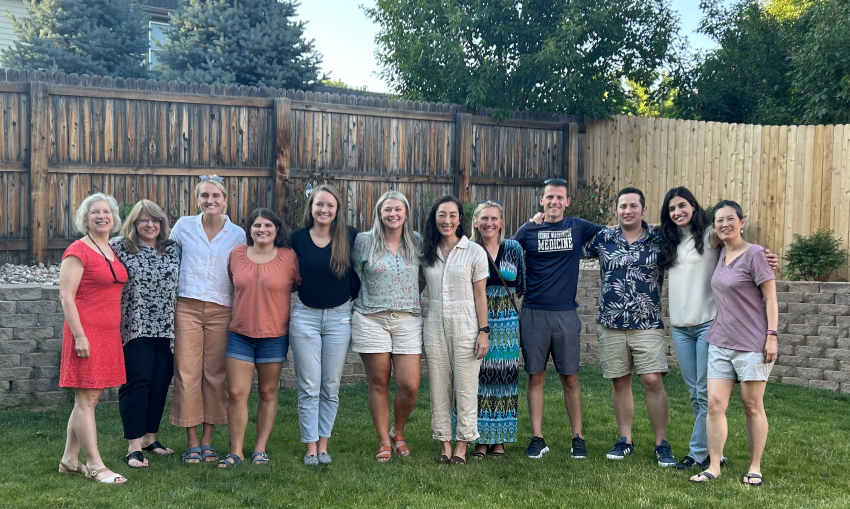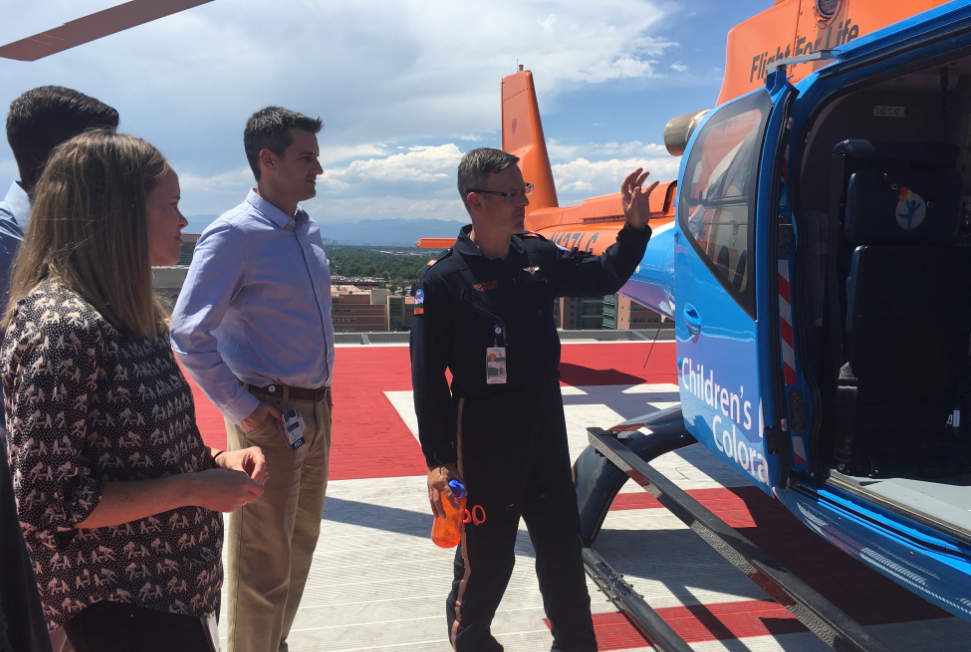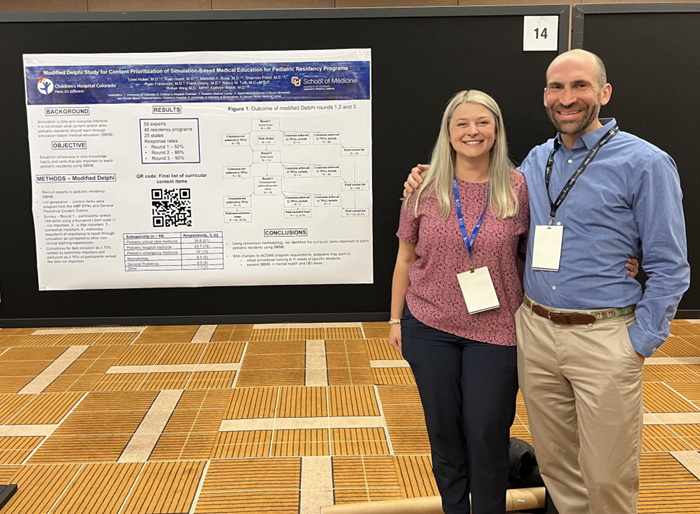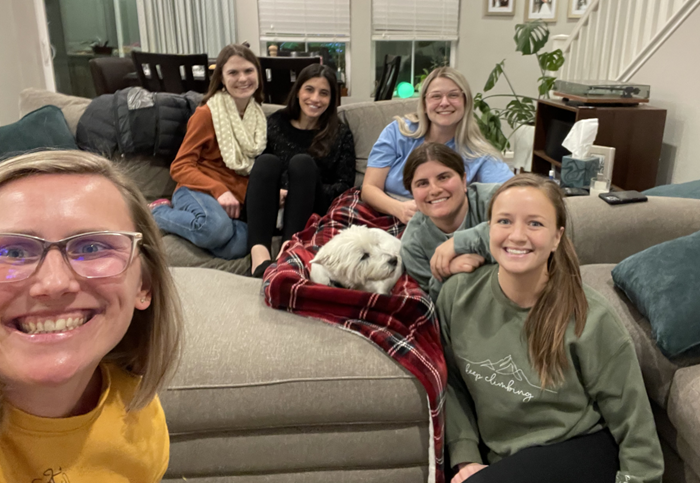Our City
300 Days of Sunshine
Denver is known for its beautiful weather, sweeping views, excellent city life, and an array of outdoor activities courtesy of our proximity to the magnificent Rocky MountainsWe believe in the spirit and resiliency of the children entrusted to our care, and we will relentlessly push the field of critical care forward to ensure we find even better ways to treat them

Vision: A world where high-quality, compassionate critical care is available to all children in need.
Mission: To deliver safe, effective, and cutting edge clinical care to all children in a family-centered environment while advancing the frontiers of critical care medicine through discovery, education, leadership and advocacy.
Values: Service, Collaboration, Inclusion
The Section of Pediatric Critical Care Medicine (PCCM) and the Department of Pediatrics at the University of Colorado School of Medicine (CU SOM) offer a fully accredited pediatric critical care fellowship for up to 12 fellows at a time (average 4 per year) designed for board-eligible pediatricians planning a career devoted to the care of the critically ill child. Our program mission is to train the future leaders of pediatric critical care, who will provide compassionate and high-quality care and contribute to the advancement of critical care medicine. To achieve this mission, we have the following:
The PCCM fellowship program offers broad-based training in both the practice of pediatric critical care medicine and the advancement of scholarship related to pediatric critical care. The section of PCCM consists of 28 physician faculty, all board certified or board eligible in pediatric critical care medicine, four full-time PhD investigators and 20 advanced practice practitioners (PA/NP). In addition, several members of the Departments of Pediatric Pulmonology, Cardiology, and Anesthesiology provide key roles in the education and training of the fellows.
The primary clinical training site for the fellowship is the Children's Hospital Colorado, a free-standing children's hospital affiliated with the University of Colorado School of Medicine. The 40-bed, Pediatric Intensive Care Unit (PICU) flexes up to 48-beds in the winter and admits approximately 3,000 patients per year from the Denver metro area and surrounding Rocky Mountain Region, serving active programs in pediatric general surgery, trauma surgery, solid organ and bone marrow transplantation, ENT, and orthopedic surgery. In addition, there is a separate Cardiac Intensive Care Unit (CICU) providing care to cardiology and cardiac surgery patients. PCCM fellows participate actively in the multidisciplinary teams responsible for the care of every patient in the PICU and the CICU.
Our City
300 Days of Sunshine
Denver is known for its beautiful weather, sweeping views, excellent city life, and an array of outdoor activities courtesy of our proximity to the magnificent Rocky MountainsOur Hospital
Ranked No. 11
Children's Hospital Colorado consistently ranks in the top 20 on the US News Best Children's Hospitals Honor Roll and as the #1 Children's Hospital in Colorado and the Rocky Mountain regionOur Department
98% Patient Survival Rate
With up to 48 beds and a care team of more than 150 clinicians, nurses and specialized staff, we see some of the most acute pediatric conditions from the surrounding states.

The first year is designed to provide the fellow trainee with the necessary experience to become an excellent clinician and teacher in the field of critical care medicine. The year is fully structured and almost entirely clinical. The required clinical rotations include:
Seven months of clinical service in the ICU, on both the pediatric ICU (5 months) and cardiac ICU (2 months) services. Fellows are responsible for all medical patients in the PICU, and they co-manage all surgical patients.
One month of pediatric anesthesiology in the first half of the year; this is designed to teach airway management, intubation, vascular access, and sedation skills.
The educational goal of the second- and third-year clinical rotations is to solidify the knowledge and skills attained during the first year, and to develop their leadership, team management and supervisory skills. The expectation is that fellows will have increasing independence through these years. The required rotations during the second and third years include:
3 – 4 months of clinical service in the ICU, on both the pediatric ICU (2 – 3 months) and cardiac ICU (1 month).
In addition to the clinical rotations, the PCCM fellows at the University of Colorado receive the following educational opportunities:
PCCM fellows at the University of Colorado School of Medicine have the additional opportunity to participate in two structured clinical electives during their second or third year:
An international cardiac intensive care elective with one of our PCCM faculty, Dr. Vohwinkel, through the International Children’s Heart Foundation
An elective at Denver Health Pediatric Intensive Care Unit, affiliated with the University of Colorado, which offers the opportunity to practice in a smaller community-based PICU under the supervision of board-certified PICU faculty.

Numerous funded academic and research opportunities are available to critical care fellows. This includes but is not limited to basic science and translational research in pulmonary vascular disease, developmental lung biology, oxygen radical-induced injury, biomechanical engineering, and neuro-trauma. Clinical research is supported through an active and growing critical care research program, and outcomes-based research, medical education research and quality improvement projects are also available to interested fellows.
The research portion of the Pediatric Critical Care Medicine Fellowship occurs all three years, with 2 months in the first year and 7 – 8 months the second and third years. During this time, fellows will be expected to engage in scholarly projects that require critical thinking and to acquire the knowledge and skills for advancing the field of critical care. The scholarly activity will be performed under the guidance of a research mentor and team, who will be identified during the first year of fellowship. Fellows will be expected to disseminate their findings at national scientific meetings and within peer-reviewed journals.
Below is a snapshot of active research led by PCCM faculty at the University of Colorado:
Mechanisms involved in pulmonary vascular remodeling and the response of the lung vasculature to hypoxia and other injuries (Stenmark lab)
Novel mechanisms driving inflammation and fibrosis in acute lung injury and pulmonary hypertension, with particular focus on a major vascular antioxidant enzyme, EC-SOD (Nozik lab)
Mechanisms of Acute Lung Injury, specifically the interface between metabolism and inflammation (Vohwinkel lab)
Functional Recovery after Prolonged Mechanical Ventilation (Maddux)
Decision-Making of Intracranial Pressure Monitoring in Children with TBI (Bennett)
Prediction Modeling of Serious Bacterial Illness in Critically Ill Children (Martin, Bennett)
Complement Activation as a Cause of Acute Kidney Injury in Critically Ill Children (Stenson)
Effect of Cardiopulmonary Bypass on Intestinal Microbiome and Tryptophan Metabolism (Leroue)
Transport Education for Pediatric Critical Care Fellows (Good, Czaja)
Leadership Assessment Tool for Pediatric Subspecialty Fellows (Czaja)
Professional Identity Formation Among Pediatric Subspecialty Fellows (Czaja)
Early Mobilization of PICU patients (Schneiter)
Nephrotoxic Injury Negated by Just-In-Time Action (NINJA) Implementation in the PICU (Stenson)
Preventing Hospital Acquired Conditions through a Multidisciplinary High-Risk Patient Rounding Model (Loi)
Positive Impact of Peer Support - A Cornerstone for Building Community (Loi)
First-year fellows in our program participate in a 3-week orientation during which they learn the basics of critical care medicine and the Children's Hospital Colorado system. Throughout the year, all fellows participate in weekly case conference and faculty-led didactic sessions in addition to longitudinal curricula in topics such evidence-based medicine (EBM) and point-of-care ultrasound (POCUS). Fellows also participate in high-fidelity, multi-disciplinary simulations in the Simulation Center as well as in situ simulations within the PICU. Additional learning opportunities for fellows are described below:
Pediatric Fellowship Educational Series
This educational series has been developed by the Committee on Fellowship Education to address area of scholarly interest common to all pediatric fellows. Nearly 100 sub-specialized physicians in training will attend 5-6 half-day seminars spread across their 3 years of fellowship.
Pediatric Biostatistics for Clinicians Course:
This course is primarily intended for 2nd and 3rd year Department of Pediatrics fellows as part of the comprehensive fellowship educational program. Designed to help fellows to develop an ability to be a critical consumer of the literature and develop familiarity with many commonly used statistical methods.
Subspecialty Excellence in Educational Leadership & Scholarship (SEELS) Program
| Fellows | |
|
|
|
|
Alexandra Wynn Obremskey, MD |
|
Lucy Paulsen Tomb, MD |
|
| Fellows | |
|
|
Alexandra Carmen Collell, MD |
|
Kathryn Emily Kalata, MD |
|
Maria Niccum, MD, MS |
|
| Fellows | |
|
|
|
|
Anneliese Grewing, DO |
|
Elizabeth A. McGinn, M.D. |
|

Dear applicant:
Our pediatric fellowships will continue conducting virtual interviews for the upcoming interview season. We look forward to sharing our programs with you and getting to know more about you!
If you have questions about the online application and interview process, please reach out to our program coordinator, Laney Coull ([email protected]).
Nationally, Pediatric Critical Care Medicine Fellowship programs use the ERAS application system . For our program the application period will begin July 16 2025. Completed ERAS applications are screened and selected applicants are invited for virtual interviews. The selection criteria are based on prior academic performance, the strength of clinical training and performance, and scholarly interests and pursuits. Letters of support from PCCM supervising physicians are strongly recommended.& Our virtual interview season begins in September and ends in November of 2026.
Fellow selection is accomplished by participation in the National Residency Matching Program Match , which occurs in the fall each year. Applicants must be eligible for a Colorado medical license. International medical graduates must have a valid ECFMG (see below)
| Date | Activity |
| Monday, May 31, 2026 | ERAS 2026 season ends at 5 p.m. ET. |
| Wednesday, June 3, 2026 | ERAS 2027 season begins at 9 a.m. ET. |
| Thursday, June 4, 2026 | EFDO will release tokens to fellowship applicants. |
| Wednesday, July 1, 2026 | July cycle fellowship applicants may begin submitting applications to programs at 9 a.m. ET. |
| Wednesday July 15, 2026 | July cycle fellowship programs may begin reviewing applications at 9 a.m. ET. |
| May 31, 2027 | ERAS 2027 season ends at 5 p.m. ET. |
| Dates | Activity |
| Wednesday, August 26, 2026 | Match Opens |
| Wednesday, September 30, 2026 | Ranking Opens |
| Wednesday, October 28, 2026 | Quota Change Deadline |
| Wednesday, November 18, 2026 | Rank Order List Certification Deadline |
| Wednesday, December 2, 2026 | MATCH DAY |
Salary and Benefits
The University of Colorado offers salary and benefits packages that are competitive with other fellowship programs across the country. Current salary levels can be found at the School of Medicine - Graduate Medical Education Stipends.
International Medical Graduates
We highly encourage International Medical Graduates (IMG) to apply to our program! If you have questions regarding the IMG experience in our program, do not hesitate to reach out! We will gladly connect you with past graduates or current fellows. To be eligible to enter our program, you must meet the following criteria:
Thanks again for your interest in our program and best wishes in your future endeavors.
Feel free to contact:
Ryan Good, MD
Associate Professor of Pediatrics
Director, Pediatric Critical Care Medicine Fellowship
Critical Care Medicine
13121 East 17th Avenue
P.O. Box 6508
Aurora, Colorado 80045
Tel: (303) 724-2393
Email:
[email protected]
or
Laney Coull
Education Program Coordinator
Pediatric Critical Care Medicine
Tel: 303-724-2393
fax: 720-777-7324
Email: [email protected]